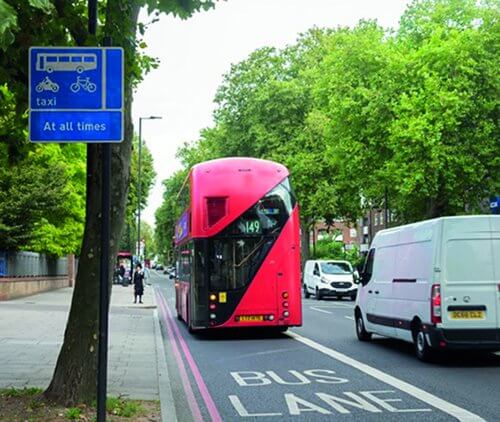Transport for London (TfL) has announced that it intends to make its trial of 24-hour bus lanes permanent, after it found that extending bus lane hours on London’s busiest roads cut journey times and helped reliability.
TfL found that improvements in bus journey times were particularly noticeable in central and inner London, especially in both the mornings and evenings and throughout Sundays. 24-hour bus lanes are also expected to improve service reliability in the longer term, which TfL said combined with the reduced journey times will make bus use more attractive and help encourage more Londoners onto buses. Before the pandemic 1.15 billion journeys were made each year on the bus routes that have benefited from the changes, out of a total of around 2.2 billion journeys. TfL said that the improvements are also expected to benefit cyclists who will be able to ride in bus lanes without traffic.
The changes will be made permanent in the New Year subject to a final statutory consultation with emergency services, local authorities and other statutory consultees. Heidi Alexander, Deputy Mayor for Transport, said: “It’s vital that buses remain a reliable, attractive option for travelling around the capital to help prevent increased congestion and worsening air quality. The extension of bus lane hours to 24 hours on London’s busiest roads received a lot of support, and these changes will reduce bus journey times and help service reliability, helping people get around the city easily and sustainably.”
Louise Cheeseman, Director of Buses at TfL, added: “Buses are the backbone of London’s transport network so it is vital that we respond to changes brought about by the pandemic and keep buses providing their efficient, reliable and attractive service.
“We closely monitored the trial of extended bus lane hours and listened carefully to feedback, and it is clear that the trial has been a success in delivering reduced journey times on buses. Shorter journey times will help deliver a more reliable bus network, and this, along with a rapidly modernising fleet, will help make buses an attractive travel option.”
The trial saw 85km of bus lanes on the Transport for London Road Network, which is made up of some of the capital’s busiest roads, move to operating 24 hours a day, seven days a week operation. General traffic was restricted from driving in the bus lanes, while blue badge parking facilities and permitted taxi access were retained. Analysis of the trial also looked at the impact on other forms of traffic when giving the bus priority for longer periods, and TfL found that the measure had no significant impact.
TfL explained that the extended bus lane hours were trialled to ensure buses remain an attractive option, creating a shift away from car use and preventing congestion, and that it engaged with members of the public and stakeholders such as accessibility groups and the watchdog London TravelWatch to understand how the trial was received. It said that there was widespread overall support to make the trial permanent and by listening to feedback has been able to reinstate parking bays at 10 locations where they will not reduce the benefits of the bus lanes.


